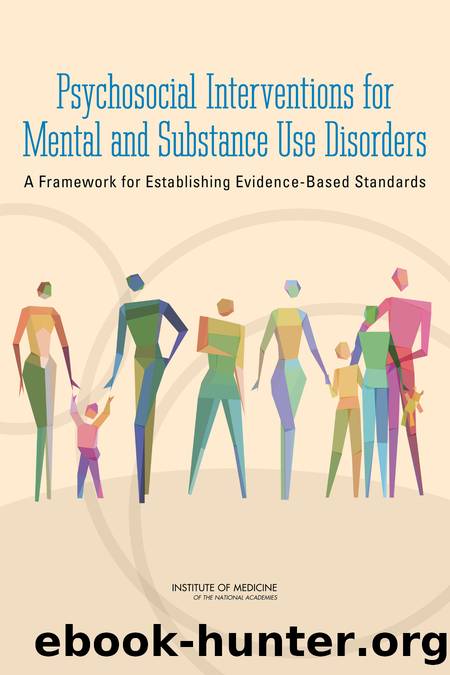Psychosocial Interventions for Mental and Substance Use Disorders: A Framework for Establishing Evidence-Based Standards by Mary Jane England

Author:Mary Jane England
Language: eng
Format: epub
Publisher: The National Academies Press
Published: 2015-10-01T00:00:00+00:00
AHRQ adds another important category, called X, when it commissions reviews. This category entails determining whether there is sufficient evidence that the intervention is not harmful.
At issue here is that, as noted earlier, the RCT is considered the gold standard for study designs, and designs that deviate from the RCT are considered less useful in informing recommendations. Yet the RCT method is not appropriate for all questions, such as those concerning implementation and system needs. In some circumstances, moreover, RCTs are not feasible because of pragmatic considerations, such as the lack of a credible control condition or a populationâs reluctance to engage in randomization, or because of ethical considerations when the only available control is no or poor treatment (Kong et al., 2009; Tol et al., 2008). Suppose the critical question being studied is the number of hours in corrective training needed by a new cognitive-behavioral therapy clinician to maintain fidelity. Unless the aim is to compare needed supervision hours with those for another intervention, the study need not be an RCT, but can be purely observational (Victora et al., 2004). Grading of the extant evidence for a psychosocial intervention, then, should depend on the question being asked, the intervention type, the desired outcome, and the quality to which the methodology of the intervention was employed.
Further, data from field trials and observational studies can complement data from RCTs and mechanistic trials, yet there is little support for this type of research in the arena of psychosocial interventions. While pharmaceutical companies historically have had the resources to field test their interventions, psychosocial interventions often are developed in the field and in academia, rather than by large companies. Whereas agencies such as the National Institutes of Health have served as the primary funders of research evaluating psychosocial interventions, funds for field and observational studies have been constrained by budgetary limitations. More funding is needed to evaluate these interventions so that systematic reviews can be conducted comprehensively.
Download
This site does not store any files on its server. We only index and link to content provided by other sites. Please contact the content providers to delete copyright contents if any and email us, we'll remove relevant links or contents immediately.
Selective Oxidation Catalysts Obtained by the Immobilization of Iron (III) Porphyrins on Layered Hydroxide Salts by Fernando Wypych Shirley Nakagaki & Guilherme Sippel Machado(320)
How Data Happened by Unknown(317)
Introduction to Social Work Practice : A Practical Workbook by Herschel Knapp(313)
Global Health Governance and Commercialisation of Public Health in India by Anuj Kapilashrami Rama V. Baru(246)
Unmasked by Emily Mendenhall(207)
Curing Cancerphobia by David Ropeik(202)
The Pandemic Divide by Gwendolyn L. Wright Lucas Hubbard and William A. Darity Jr(192)
Restoring Quality Health Care by Scott W. Atlas(187)
Transforming Health Care Scheduling and Access: Getting to Now by Gary Kaplan(184)
Feminist Global Health Security by Clare Wenham(182)
FALSE PANDEMICS: ARGUMENTS AGAINST THE RULE OF FEAR by Wolfgang Wodarg(177)
Oversight and Review of Clinical Gene Transfer Protocols: Assessing the Role of the Recombinant DNA Advisory Committee by Rebecca N. Koehler(169)
The Making of a Pandemic: Social, Political, and Psychological Perspectives on Covid-19 by John Ehrenreich(162)
Psychosocial Interventions for Mental and Substance Use Disorders: A Framework for Establishing Evidence-Based Standards by Mary Jane England(160)
Insane Society: A Sociology of Mental Health by Peter Morrall(159)
Pandemic India by Arnold David;(158)
Risk Communication and Infectious Diseases in an Age of Digital Media by Anat Gesser-Edelsburg Yaffa Shir-Raz(157)
The Metropolitan Academic Medical Center by David E. Rogers Eli Ginzberg(155)
Into Africa, Out of Academia by Kwan Kew Lai(148)
